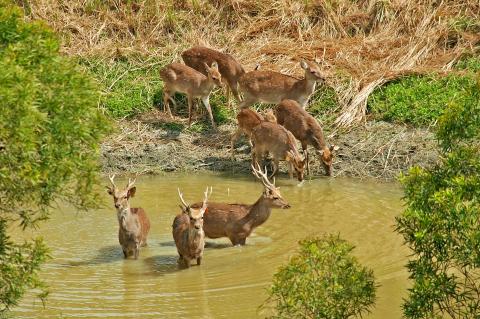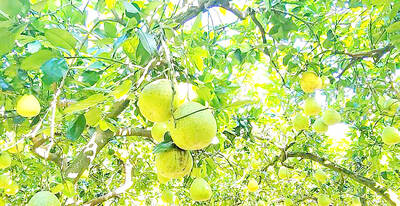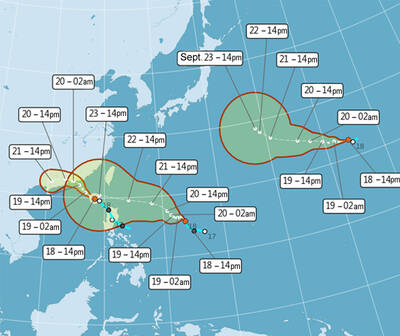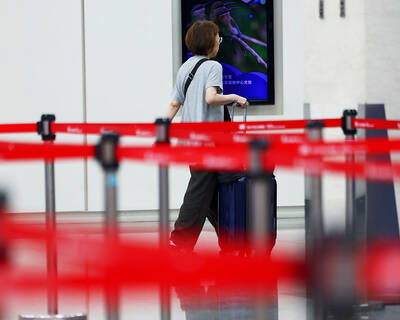The government has been urged to consider allowing the hunting of Formosan sika deer in Kenting National Park, because the project to reintroduce the deer to the area has proven so successful that they are beginning to cause damage to the park’s ecology and nearby agriculture.
There are nearly 2,000 Formosan sika deer living in Pingtung County’s Hengchun Peninsula (恆春半島), but some have made their way into the Nanjenshan Ecological Protection Area (南仁山) and pose a risk to the protected plants in the area.
A report titled Kenting National Park Agricultural Risk Management Plan, focusing on the control of the Formosan sika deer population, was presented at Kenting National Park headquarters on Wednesday in the hope of reaching a balance between the deer, the environment and humans.

Photo: Tsai Tsung-hsien, Taipei Times
National Dong Hwa University environmental science professor Kurtis Pei (裴家騏), who helped draft the plan, said the idea of allowing hunting to control the deer population was brought up by some academics during the meeting.
Many nations, including Japan, the US and Australia, have used hunting to prevent overpopulation of animals, Pei said, adding that Taiwan still has plenty of restrictions in terms of laws and has a negative view of hunting.
However, changes would have to be made to the Indigenous Peoples Basic Act (原住民族基本法), the Wildlife Conservation Act (野生動物保育法) and the National Park Act (國家公園法) before hunting could be considered an option, Pei said.
While the Wildlife Conservation Act stipulates that “when protected wildlife causes damage to crops, poultry, livestock or aquaculture... [they] may be hunted or killed using humane methods approved by the authorities to prevent the above-mentioned damage,” the National Park Act bans hunting altogether.
“The government could consider amending the law to allow the use of traps to hunt Formosan sika deer in winter and prevent agricultural production from being damaged in spring and summer,” Pei said.
Kenting National Park director Liu Pei-tung (劉培東) said birth control, including short-acting contraceptives that cost less than neutering, is the direction that the park is leaning toward.
Liu said the park is testing dosages with captive Formosan sika deer and hopes to apply the method to wild animals soon.
The park said Formosan sika deer have no natural enemies other than humans and can eat up to 151 kinds of plant, which has become a burden to the forest’s ecology.
Farms in Pingtung County’s Manzhou Towship (滿州) close to the wildlife area have had their crops — including dragon fruit, black peas, wax apples and various vegetables — spoiled by wild deer, with the only countermeasure available being the building of fences, possibly electric, the park said.
Formosan sika deer once roamed widely along the nation’s plains and in low mountain areas until about 200 to 300 years ago, when they became an important export product and were almost hunted to extinction.
In 1974, Formosan sika deer were listed by the International Union for Conservation of Nature and Natural Resources as critically endangered. The government initiated the Formosan Sika Deer Restoration Program in Kenting in 1984.
Ten Formosan sika deer from Taipei Zoo were released into the wild in the Shirding (社頂) area of the park in 1994 and releases continued until 2009. During that period, a total of 233 deer were released into the wild and, after years of reproduction, there are now about 2,000 deer on the peninsula, of which about 1,000 inhabit the Shirding, Longzaipu (籠仔埔) and Shuiwaku (水蛙窟) areas.

NEW AGREEMENT: Malaysia approved imports last year after nearly two years of negotiations and inspections to meet quarantine requirements, officials said Up to 3.6 tonnes of pomeloes from Taiwan cleared Malaysian customs on Friday, in the first shipment of Taiwanese pomeloes to Malaysia. Taiwan-grown pomeloes are popular in domestic and overseas markets for their tender and juicy taste, the Ministry of Agriculture’s Animal and Plant Health Inspection Agency said. The fruit is already exported to Japan, Canada, Hong Kong, Singapore and the Philippines, it added. The agency began applying for access to the Malaysian market in 2023, compiling data on climate suitability, pests and diseases, and post-harvest handling, while also engaging in nearly two years of negotiations with Malaysian authorities and submitting supplementary

PEAK MONTHS: Data showed that on average 25 to 27 typhoons formed in the Pacific and South China seas annually, with about four forming per month in July and October One of three tropical depressions in the Pacific strengthened into a typhoon yesterday afternoon, while two others are expected to become typhoons by today, Central Weather Administration (CWA) forecaster Lee Ming-hsiang (李名翔) said yesterday. The outer circulation of Tropical Depression No. 20, now Typhoon Mitag, has brought light rain to Hualien, Taitung and areas in the south, Lee said, adding that as of 2pm yesterday, Mitag was moving west-northwest at 16kph, but is not expected to directly affect Taiwan. It was possible that Tropical Depression No. 21 would become a typhoon as soon as last night, he said. It was moving in a

Tigerair Taiwan and China Airlines (CAL) today announced that several international flights were canceled or rescheduled due to Typhoon Ragasa. The Central Weather Administration (CWA) has maintained sea and land warnings for the typhoon. Its storm circle reached the Hengchun Peninsula (恆春半島) on Taiwan's southern tip at 11am today. Tigerair Taiwan said it canceled Monday's IT551/IT552 Taoyuan-Da Nang, IT606/IT607 Taoyuan-Busan and IT602 Taoyuan-Seoul Incheon flights. Tomorrow, cancelations include IT603 Seoul Incheon-Taoyuan, as well as flights between Taoyuan and Sapporo, Osaka, Tokyo Narita, Okinawa, Fukuoka, Saga, Tokyo Haneda, Nagoya, Asahikawa and Jeju. On Wednesday, the IT321/IT322 Kaohsiung-Macau round-trip would also be canceled. CAL announced that today's

About nine Taiwanese are “disappeared,” detained, or otherwise deprived of freedom of movement in China each month, the Mainland Affairs Council (MAC) said yesterday. Between Jan. 1 last year and Aug. 31 this year, 188 Taiwanese travelers went missing, were detained and interrogated, or had their personal freedom restricted, with some questioned in airports or hotel lobbies, the council said. In a statement ahead of the Mid-Autumn Festival, the council urged people visiting China for any reason to be highly vigilant and aware of the risks. Of the reported cases, 50 people were “disappeared” after entering China, 19 were detained and 119 had